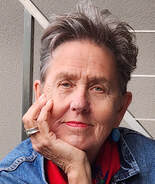My grandparents were kind people. And they were also unthinkingly vicious racists. They talked of "niggers". "Blacks have only come down out of the trees in the last few years" my grandfather explained to me. "You can't expect them to be civilised". "Get that out of your mouth" my grandmother shouted when she saw me sucking on a penny. "Some filthy Chinaman’s been touching that!” They called anyone they suspected of greed a Jew.

The dog ran ahead with busy nose to the ground. As I walked, I listened on my iPod to Roald Hoffmann, an elderly Jewish man, recount his experiences as a child in Nazi-occupied Poland.
To listen more closely, I paused in my walk and watched a handful of ducks sculling tranquilly on the pond. Mr Hoffman told how, for the whole time they were hidden, his mother had kept him secure in a "cocoon of love". Then he told how, long after the war and his settlement in the U.S., he returned to Poland with his own son and his seven-year-old grandson. He found the village schoolhouse still standing though it had changed somewhat in the passing years. Mr Hoffman was overjoyed to find that his hiding place had been rebuilt as a science lab.
As I continued to listen, two large flocks of ducks appeared in the sky above me. Each duck in each flock landed on the pond in perfect concert with its fellows, ruffling for a moment its mirrored surface. Something about the effortless elegance of this manoeuvre, the sense of life being utterly as it should be, and Mr Hoffman’s voice in my ear talking with such equanimity about his dark childhood brought my grandparents to mind.
I lived with, or close by my grandparents for much of my childhood. My grandmother cooked vast steak and kidney pies for our dinner. After the evening meal she often played the piano. My grandfather, unmoored the roll-your-own fag from his lip where it was usually glued, and sang along in a sweet tenor voice. "Beautiful dreamer, wake unto me" he’d sing, or “Daisy, Daisy, give me your answer, do. I'm half crazy - all for the love of you!” On winter mornings he got up early to light the kerosene heater. By the time I woke up the house was cosy and reeked of kerosene and my school clothes were warming beside the heater. My grandmother made me breakfasts of bread sprinkled with sugar and drowned in hot milk.
They were kind and they were vicious racists. They talked about "niggers". "Blacks have only come down out of the trees in the last few years" my grandfather explained to me. "You can't expect them to be civilised". When my grandmother discovered me sucking on a penny she slapped it from my hand. "Get that out of your mouth!" she shouted. "Some filthy Chinaman’s been touching that!” Anyone they suspected of greed they called a Jew.
My grandparents had emigrated to New Zealand from England after WWI because my grandfather couldn’t find work. As an 18-year old on the battlefield of Ypres he collected the body parts of other young men for burial. Two of my grandmother’s young brothers died in that war. Like many migrants before them, they must have arrived in their new home full of grief for the past and anxiety about the future but for some reason this shrank, rather than expanded, their capacity for compassion.
My daughter's father is Korean, a fact that is perhaps the result of a deep unconscious impulse in me to say no to my grandparent’s racism. When my daughter was about eight I took her to see Barry Humphries performing as Edna Everidge. When Edna made a disparaging comment about Asians, my daughter turned to me and asked "Why is she being so mean about Asians?” It was the question I had not dared ask my grandparents when I was her age. I didn't ask why they thought the hardworking Chinese family at the greengrocers were filthy. Or why the man who repaired our shoes and had numbers tattooed on his arm might be greedy.
After my walk, I put away my iPod and drove into Nelson. There, I discovered that a Heritage Week ceremony had been held, just that morning, celebrating Nelson's Jewish history. While I had been listening to Mr Hoffman’s story, a rabbi had unveiled a panel in Synagogue Lane (once Church Lane) where a Jewish synagogue had stood from 1895 to 1917.
Curious to know more about Roald Hoffman, I Googled him and found that he is a Nobel Prize-winning chemist. This was the reason he was so delighted to find on his return to Poland, that his childhood prison had been transformed into a science laboratory.
Is it by these odd coincidences that progress happens? A place of confinement becomes a place where discoveries can be made. A child, who my grandparents would have dismissed as a “half-caste”, is not afraid to ask why people are cruel to one another. A persecuted Jewish boy survives and grows up to be a world-class scientist with such unimpaired joie de vivre that he is part of “Entertaining Science” a New York cabaret, where science is the subject of “music, theatre, magic, poetry … in the company of friends and interested strangers”.
One last odd coincidence. Roald Hoffman, now a professor at Cornell University, is visiting New Zealand in 2013 as a keynote speaker at the 6th International Conference on Advanced Materials and Technology.
 RSS Feed
RSS Feed

